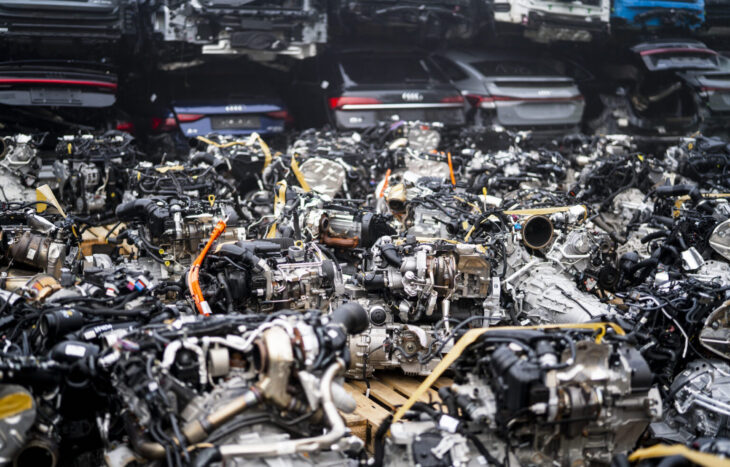Audi completed its MaterialLoop joint project, which aimed to close the loop on more material cycles in the automotive industry. The company worked together with 15 partners from the research, recycling, and supplier sectors — including aluminum sheet and recycling company Novelis — to investigate the reuse of post-consumer materials from vehicles at the end of their life cycle. These materials would then be used for the production of new cars.
As part of Audi’s circular economy strategy, the project provides valuable insight on how a circular economy can be put into practice. For many years, very few of the materials used in the production of new vehicles have been recovered from old cars — and Audi wants to change that. In addition to recovering useful materials, the company wants to avoid downcycling, which is a loss of quality in materials resulting from the recycling process.
“The MaterialLoop project underscores our ambitious vision to operate a highly efficient circular economy concept for end-of-life vehicles,” says Markus Duesmann, CEO of Audi. “It is our goal to recover as many materials as possible at a high level of quality and reuse them in production. This will save valuable primary materials and lower the products’ ecological footprint. Simultaneously, direct access to secondary materials can contribute to increased security of supply. Raw materials would no longer have to be extracted.”
The MaterialLoop Project
As part of the MaterialLoop joint project, 100 vehicles were dismantled in October 2022, including former development cars, among others. After disassembly, the remaining car bodies were shredded and sorted into material groups comprising steel, aluminum, plastic, and glass, in cooperation with the partner companies. With the aim of testing the reuse of such materials in the production of new cars, Audi defined and piloted the further recycling process together with project partners from the recycling industry, the Audi supply chain, and academia.
“Our emphasis on cycles within the industry enables us to use our products and the materials they’re made from for as long as possible,” explained Johanna Klewitz, head of supply chain sustainability at Audi. “Our vision is to rely less on secondary materials from other industries in the future.”
Besides the technical feasibility of returning materials in the Audi supply chain, improving future generations of Audi vehicles’ ability to be recycled was also a focus of the project. Dennis Meinen, an expert for circular economy at Audi, stated “At its core, circular economy is about handling resources responsibly. Longevity, repairability, and, indeed, our products’ ability to be recycled are thus all in focus.”
Recovering Aluminum
For Novelis, driving a more circular economy includes closing both the production and end-of-life loops — including incorporating pre-consumer and post-consumer scrap into the product mix. The company has developed closed-loop recycling systems with some of the world’s largest car makers, capturing and recycling aluminum production scrap from the automotive stamping process. The next frontier in automotive circularity is to explore, test, and learn end-of life opportunities with customers.
End-of-life recycling of aluminum offers great advantages for the automotive industry, as closing the loop preserves the value of the alloy, minimizes environmental impact, and creates a secure supply chain. Recycling aluminum also requires 95% less energy to produce than primary aluminum, with commensurate savings in CO2 emissions. Already, Novelis’ delivers alloys that contain up to 80% recycled content to automotive customers.
“We continuously advance our recycling processes and alloys to push the limits on how much recycled content we can use in our products,” explained Michael Hahne, vice president and general manager of Automotive, Novelis Europe.“Building a circular economy for aluminum is a focus for Novelis and returning end-of-life scrap to its source is key to become more efficient and, thus, collaborations and new ways of partnering will need to be established. Therefore it was important for us to participate in [Audi’s MaterialLoop] project.”
Since 2017, aluminum is managed within a recycling circle at the Audi sites Ingolstadt, Neckarsulm, and Győr, as well as at the Volkswagen site Bratislava. Aluminum offcuts that occur during production are returned directly to the supplier. There, they are recycled to form aluminum sheet of the same quality, which Audi then reuses in production. This saves precious primary raw materials and ensures the cars enter the use-phase with a better environmental balance.
As part of the MaterialLoop project, Novelis contributed its expertise as technologically advanced aluminum recycler. The company also provided aluminum alloys, which are widely used in the automotive industry.
Through the project, Novelis gained valuable insights into current sorting processes and the improvements needed to increase the recovery rate of aluminum at the end-of-life stage.Sorting efficiency and technology play a key role in ensuring the economic viability of recycling. Taking the separability of the materials into account as early as the design stage of vehicles will be a game changer.
Novelis noted that the pilot project is just the beginning of a journey toward a circular economy for vehicles. As society moves toward a more sustainable future, initiatives like this are critical to reducing waste, conserving resources, and protecting the environment.

